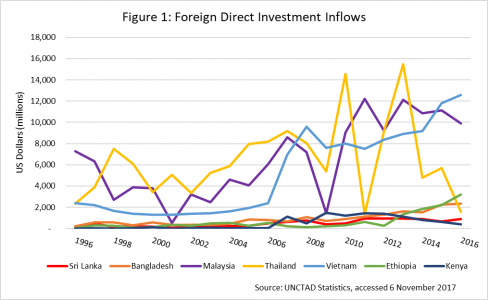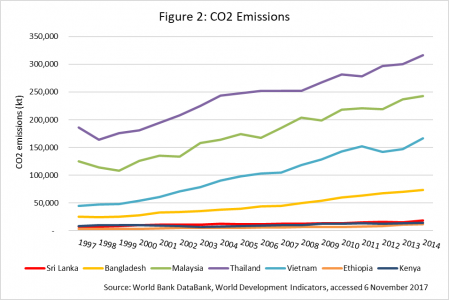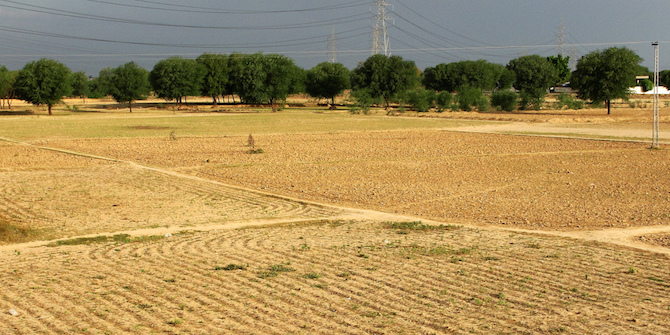 Making a case for the importance of Paris Agreement for developing countries, Anishka De Zylva writes that it offers economic and geopolitical opportunities for Sri Lanka. She explains how Sri Lanka could maximise these opportunities for its development, while demonstrating its own commitment to the accord and regional leadership on climate change.
Making a case for the importance of Paris Agreement for developing countries, Anishka De Zylva writes that it offers economic and geopolitical opportunities for Sri Lanka. She explains how Sri Lanka could maximise these opportunities for its development, while demonstrating its own commitment to the accord and regional leadership on climate change.
The Paris Agreement is an unprecedented global commitment to combating climate change. Sri Lanka is one of 195 states that adopted the Agreement in December 2015, and to date, 169 states have ratified it, including Sri Lanka. President Donald Trump’s announcement that the US will withdraw from the Agreement threatened its viability by leaving a vacuum in climate change leadership. Fortunately, the European Union and China appear to have stepped in to fill this leadership vacuum in climate change. India and Japan have also shown leadership by keeping their commitment to the Agreement. Their combined resolve to continue the accord presents Sri Lanka with a window of opportunity to exploit the benefits of the Paris Agreement, while demonstrating Sri Lanka’s own commitment to the accord and its regional leadership on climate change.

First, the Paris Agreement is a new opportunity for development aid. Under the Agreement, Sri Lanka has already obtained financial assistance of around US $38 million from the Green Climate Fund and around $262 million from the Green Environmental Facility. However, the government could increase Sri Lanka’s access to “climate finance” by emulating the El Salvadoran example. In El Salvador, the Ministry of Foreign Affairs is developing a database of climate finance opportunities. Sri Lanka could start with a similar initiative to improve awareness and gain access to other sources of funding, such as the Adaptation Fund ($350 million) and Climate Investment Funds ($8.3 billion).
Second, the Paris Agreement is a business opportunity for Sri Lanka, particularly to attract more investment. Sri Lanka performs relatively poorly compared to other Asian economies in attracting foreign investment (see Figure 1).

According to the International Finance Corporation (IFC), the Paris Agreement could create investment opportunities worth $23 trillion in emerging economies by 2030. China, Indonesia, the Philippines and Vietnam are projected to have a ‘green’ investment potential of $16 trillion (mainly in green buildings and sustainable transport). Similarly, India and Bangladesh are projected to have a green investment potential of $2.2 trillion (mainly in climate-resilient infrastructure).
To attract green or “climate-smart investment,” Sri Lanka could channel its own public finances into sustainable infrastructure and transport initiatives. It should also consider moving the responsibility of climate change away from the Ministry of Environment to a ministry with a broader, coordinating role. In Colombia, for example, the government shifted the responsibility of climate change policy from its Ministry of Environment to its National Planning Department. A similar action in Sri Lanka could more efficiently incorporate the country’s commitments under the Paris Agreement into national development plans.
Third, the Paris Agreement is an opportunity for behavioural change. Since, Sri Lanka is not a major emitter (see Figure 2) the government should encourage sustainable behaviour among consumers and producers to keep future emissions low. Sri Lanka could accomplish this through economic incentives for sustainability, like carbon pricing.

The IFC reported that around 40 countries are pricing carbon — including seven of the 10 largest global economies — and that corporate carbon pricing is growing in regions like China, South Korea, and Europe. To advance the use of economic incentives like carbon pricing, Sri Lanka could gain from global resources like the Carbon Pricing Leadership Coalition. This coalition assists the development of well-designed carbon pricing systems in countries around the world, and is creating an evidence base for policymakers to identify the most effective carbon pricing systems and policies.
Fourth, the Paris Agreement is an opportunity for stronger and more beneficial ties with China and India. Both countries are expected to exceed their targets under the Agreement and are no longer viewed as obstacles to climate change efforts. They have successfully reduced the cost of renewable energy technology through large investments in solar and wind power, and are attempting to shift away from coal power. China also houses five of the leading six solar panel manufacturers and five of the leading 10 wind turbine makers in the world. Sri Lanka could learn from these innovations, especially since many developing countries cannot easily afford renewable energy, and Sri Lanka committed to 100 percent renewable energy generation by 2050 at the 22nd Climate Conference in Marrakesh, Morocco in 2016.
In conclusion, to fully benefit from the Paris Agreement, Sri Lanka’s efforts must go beyond ratifying and submitting information on its contributions under the accord. Sri Lanka must actively seek financing; identify global trends, innovations and best practices in combating climate change; and develop new international partnerships to engage those trends, innovations and practices. Given the expected scale and potential impact of climate change, including in Sri Lanka, this is not an opportunity to miss. The country’s future as a sustainable hub in the Indian Ocean may even depend on it.
This article gives the views of the author, and not the position of the South Asia @ LSE blog, nor of the London School of Economics. Please read our comments policy before posting.
About The Author
 Anishka De Zylva is a Research Associate at the Lakshman Kadirgamar Institute of International Relations and Strategic Studies (LKI) in Colombo. She tweets @AnishkaDeZylva
Anishka De Zylva is a Research Associate at the Lakshman Kadirgamar Institute of International Relations and Strategic Studies (LKI) in Colombo. She tweets @AnishkaDeZylva






